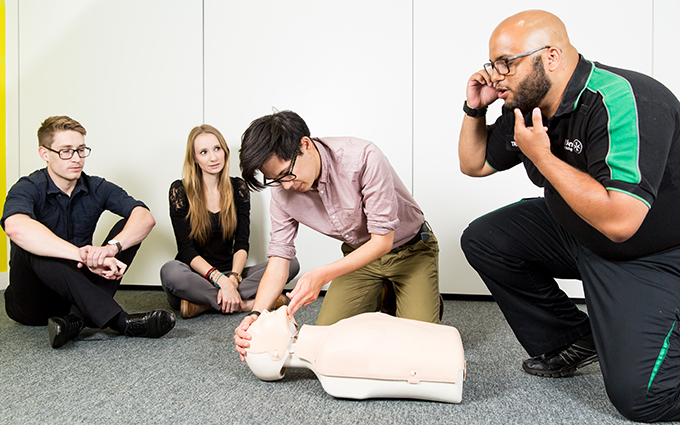Published: 3rd Febuary 2025.
Last updated: 3rd Febuary 2025.
Author: Cara Sherratt.
Contents

Generally, we should all practice the principles of self-care to prevent health problems from developing. For this, we have a quick guide to looking after yourself available to download and start practicing. However, this heart month we’ll be focusing on the everyday things that you can do to keep your heart healthy and strong.
In the mission to try to prevent coronary heart disease, high cholesterol and low blood pressure, there are several aspects of our daily lives where individuals can make a positive impact with small changes. From diet and exercise to smoking and alcohol consumption, we’ll cover the top 8 things that you can do to try to reduce your risk of developing heart-related issues.
Prioritise a Balanced Diet
Being mindful about your food intake and eating a healthy, balanced diet is one of the most impactful daily choices that we can make when trying to stay fit and healthy. For maintaining heart health, ensure you are prioritising fibrous foods such as fresh fruit, vegetables and whole grains.
Another thing to monitor when trying to look after your heart is your intake of salt, sugar and saturated fat. Prioritise healthy fats such as oily fish, nuts and seeds and moderate foods such as butter, cakes and fatty cuts of meat.
Do Regular Movement & Exercise
Combine a healthy, balanced diet with being more physically active to keep your heart happy. Regular exercise can reduce your risk of having a heart attack, lower your cholesterol levels and keep your circulatory system operating efficiently.
Any form of movement that makes your heart work harder, from walking and swimming to running and dancing, can improve your heart’s output and improve its strength. For those who are currently inactive, introducing small movements and increasing duration, frequency and intensity over time can make a huge impact to your heart health.
Weight Management
Pairing diet and exercise in turn will assist with weight management, which has been shown to impact the performance of your heart. A high BMI or waist circumference has been linked to a higher risk of developing cardiovascular disease. If you would like more support to understand your ideal weight, or tips to lose weight, make an appointment with a GP practice nurse and start a conversation that can lead to a healthier heart.
Cut Down on Smoking and Tobacco
Smoking is a major risk factor to developing a multitude of health problems, including those related to heart health. Tobacco use is harmful to your health and giving up has both immediate and long-term health benefits. Simply put, if you smoke, giving up will reduce your risk of developing coronary heart disease.
Limit Alcohol Consumption
Alcohol can cause damage to the heart muscle, high blood pressure and abnormal heart rhythms. The risk to your health increases when drinking any amount of alcohol on a regular basis. So, if you want to look after your heart health, consider reducing your alcohol consumption or remain within alcohol recommendation limits. Men and women are advised to not regularly drink more than 14 units a week, which is less than one glass of wine per night, per week. Lastly, binge drinking (or drinking heavily across a short amount of time) has also been linked to an increase in the risk of heart attacks.
Monitor Blood Pressure
Keep your blood pressure under control to support your heart. As previously mentioned, eating a healthy diet low in saturated fats and salts and exercising regularly can begin to lower your blood pressure. If you have high blood pressure, you can talk to your GP for an assessment as some people may need to take medicine to lower blood pressure. It is generally recommended to get your blood pressure checked by a qualified health worker as high blood pressure can hurt your heart, especially when combined with other factors such as poor diet, smoking and drinking alcohol.
Take Care of Your Teeth and Gums
There is a possible link with your oral health and heart health that may suggest the two are connected. Bacteria that can infect the gums and cause gingivitis can potentially move elsewhere in the body and cause inflammation of blood vessels, or heart attacks. Removing plaque from your teeth by brushing and flossing can minimise tooth decay and tooth loss. A recent study showed that periodontal disease can almost double your risk of developing heart disease.
Minimise Stress
Stress is a natural body response to pressure or challenging situations. Although stress alone might not cause a heart attack, it is a risk factor for heart and circulatory diseases because of the habits that sometimes go along with it.
It is normal to feel stress, and everybody feels stress in a different way. However, how you react to stress could be damaging your heart. Poor health behaviours such as overeating, smoking or not taking medications, as we’ve discussed, can contribute to heart problems. Try to manage your levels of stress and keep them to a healthy level to protect your heart.
When looking to reduce your risk of heart related issues, addressing these areas of your lifestyle can make a huge impact. Taking care of your heart should be a lifelong priority but it can start with small, realistic and actionable changes. Taking good care of your physical and mental health isn’t easy but is worthwhile. For further first aid advice for angina attacks, heart attacks and cardiac arrest, check out our advice pages and online resources.
Sources
https://www.nhs.uk/conditions/coronary-heart-disease/prevention/
https://www.who.int/philippines/news/feature-stories/detail/how-to-take-care-of-your-heart-health
https://www.nhs.uk/conditions/alcohol-misuse/
https://www.caba.org.uk/your-health/your-physical-wellbeing/looking-after-your-health/keep-your-heart-healthy.html
https://www.health.harvard.edu/diseases-and-conditions/gum-disease-and-the-connection-to-heart-disease#:~:text=The%20bacteria%20that%20infect%20the,attack%20and%20stroke%20may%20follow.
https://www.heart.org/en/healthy-living/healthy-lifestyle/stress-management/stress-and-heart-health
https://www.bhf.org.uk/informationsupport/risk-factors/stress










